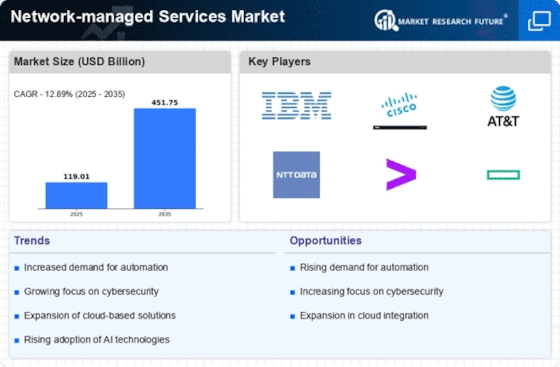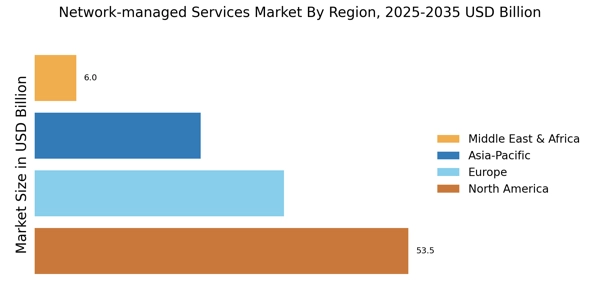Integration of IoT Devices
The proliferation of Internet of Things (IoT) devices significantly influences the Network-managed Services Market. With billions of devices expected to be connected by 2025, the demand for effective network management solutions is likely to escalate. Organizations are increasingly reliant on IoT for operational efficiency, data collection, and real-time analytics. This trend necessitates advanced network management services to ensure optimal performance and security of interconnected devices. The market for IoT-related network management services is projected to grow substantially, potentially reaching USD 50 billion by 2027. Consequently, the integration of IoT devices is a key driver for the Network-managed Services Market.
Rising Demand for Remote Work Solutions
The Network-managed Services Market experiences a notable surge in demand for remote work solutions. As organizations increasingly adopt flexible work arrangements, the need for reliable network management services becomes paramount. This shift is evidenced by a projected increase in remote work technologies, with estimates suggesting that the market for remote work solutions could reach USD 100 billion by 2026. Network-managed services play a crucial role in ensuring seamless connectivity and security for remote employees, thereby enhancing productivity and collaboration. Companies are likely to invest in these services to maintain operational efficiency and support their workforce, indicating a robust growth trajectory for the Network-managed Services Market.
Growing Focus on Data Privacy Regulations
The Network-managed Services Market is significantly impacted by the increasing emphasis on data privacy regulations. As governments worldwide implement stricter data protection laws, organizations are compelled to enhance their network security measures. Compliance with regulations such as GDPR and CCPA necessitates robust network management services to safeguard sensitive information. This trend is likely to drive investments in network-managed services, as companies seek to mitigate risks associated with data breaches and non-compliance penalties. The market for compliance-driven network management solutions is expected to expand, reflecting the critical role of data privacy in shaping the Network-managed Services Market.
Advancements in Network Automation Technologies
The Network-managed Services Market is witnessing a transformative shift due to advancements in network automation technologies. Automation enhances operational efficiency by streamlining network management processes, reducing human error, and enabling proactive issue resolution. As organizations increasingly adopt automated solutions, the demand for network-managed services that incorporate these technologies is likely to rise. Market analysts project that the network automation segment could grow to USD 30 billion by 2025, underscoring the importance of automation in the Network-managed Services Market. This trend not only improves service delivery but also allows organizations to focus on strategic initiatives.
Increased Investment in Cybersecurity Solutions
The Network-managed Services Market is experiencing heightened investment in cybersecurity solutions. As cyber threats become more sophisticated, organizations are prioritizing the protection of their networks and data. This trend is reflected in the projected growth of the cybersecurity market, which is expected to reach USD 300 billion by 2026. Network-managed services that offer integrated cybersecurity solutions are becoming essential for businesses aiming to safeguard their operations. The increasing awareness of cyber risks is likely to drive demand for comprehensive network management services, positioning cybersecurity as a pivotal driver in the Network-managed Services Market.

















